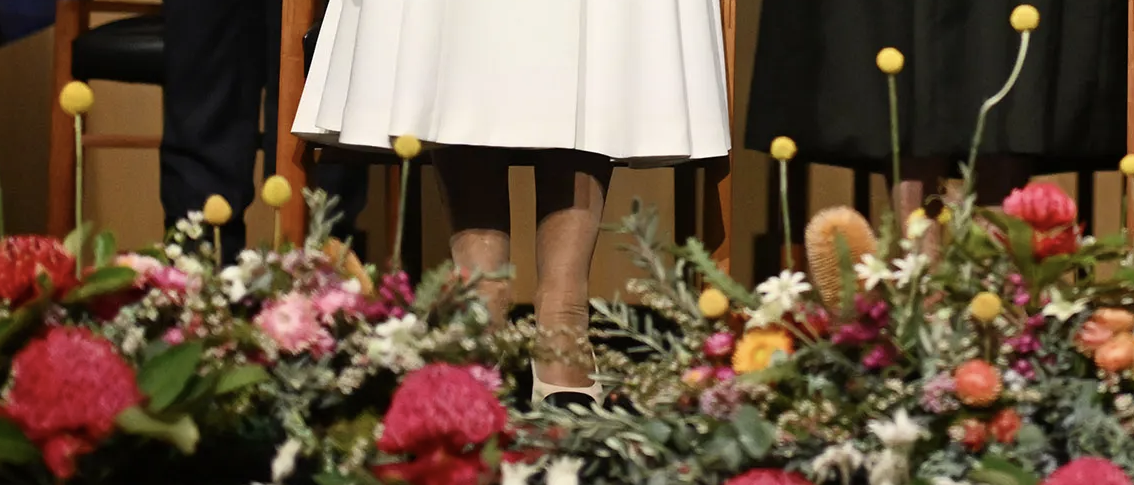7 November 2024
Someone was always going to do it. Someone was always going to say it. And this time around, it was Senator Lidia Thorpe.
Whether we applaud her tactics as ballsy, or deplore them as rude and unrepresentative of the general spirit of reconciliation, surely we all knew that someone was going to use the opportunity of King Charles and Queen Camilla’s Australian tour to point at our decidedly un-invisible elephant-in-the-room and say: ‘Look, will you? It’s still there’.
The elephant, in this case – the ‘it’ that is still there – is colonialism. As was graphically demonstrated by last year’s Voice to Parliament debate and referendum, the impacts of colonisation on our country and communities are neither resolved, nor in the past.
A lot of column centimetres have been dedicated this week to whether or not Senator Thorpe should have publicly heckled the royals during their visit. Of much more interest, however, is how King Charles and Queen Camilla acted … or did not act.
Addressing the reception at Parliament House from behind a wall of banksias, billy buttons and waratah, the King diplomatically expressed gratitude for a welcome to country ceremony staged in his honour, paid tribute to the generosity he had received from Australia’s First Nations people over the decades, and – in the context of a series of remarks on climate change – lauded the ‘timeless wisdom of indigenous people’.
He went on to characterise Australia via the most tired of tropes, using the expression ‘sunburned country’ and waxing lyrical about birdsong and mateship in adversity. It was the speech of a man who expected to go home to the UK with a suitcase full of gifted tea-towels copiously illustrated with Sturt desert peas, silhouettes of Uluru and the odd boomerang.
It could not be said that the King ignored the elephant entirely; he did admit to having witnessed Australia’s ‘long and sometimes difficult journey towards reconciliation’. But as a gesture towards the pressing issues with which our nation still grapples, his comment was ineffectual: little more than the twitch of an aristocratic pinkie.
He spoke as if this ‘journey’ was something he had learned about via a documentary on the telly, watched while nicely tucked up under a tartan blankie at Balmoral. He seemed at pains to appear remote from it, as if King George III – who commanded the colonisation of this country’s eastern seaboard – were somebody else’s fourth great grandfather. Not his!
And when, after the King’s anodyne speech, Lidia Thorpe yelled out over the top of the golf-clapping about gritty realities like dispossession, massacres and the theft of body parts, the Queen in her white frock – as if she thought she were in her box seat at the Royal Albert Hall – turned to one of her neighbours with a little chuckle, as if the whole scene was terribly amusing, really.
What a missed opportunity. Imagine if the Queen had had the temerity to express sorrow, or shame. Imagine if the King had found the courage, while standing in front of Australia’s parliament, to say something real and meaningful about his understanding of the horrors that unfolded in the name of the monarchy he now spearheads and embodies. Imagine if, just for a moment, either one of them had got real.
And so, the King and Queen will go home. But, while they’re busily restocking the third kitchen drawer of each of their residences, here in Australia the repercussions of colonialism will continue to resound.
In the weeks and months to come, Tasmania’s police, courts and politicians will be troubled by the wild card that is puralia meenamatta, or Uncle Jimmy Everett.
The veteran First Nations environmental protestor was arrested on March 19 this year for ‘trespass’ and failed to appear in court on June 3, and again on September 23, since he does not consider himself bound by colonial law. He was arrested again this week, in the Bradys Lake forests of the Central Highlands, on his 82nd birthday, but will continue to refuse to attend court to answer charges laid.
‘I am a plangermairreenner from meenamatta country in the north-east Midlands of lutruwita/Tasmania,’ Uncle Jimmy writes, ‘and I do not recognise any colonial authority over me because I am not an Australian citizen, and the Australian-British colonial laws that I challenge have no jurisdiction to arrest me for defending my Law in Country from ongoing destruction of our natural world.’
Uncle Jimmy says he will not attend court willingly; he’ll have to be forcibly dragged. He’s fully aware that the optics of a highly respected First Nations octogenarian being physically overpowered, and potentially incarcerated – because he stood up for the environmental health of country never ceded by his people – will be appalling.
Where this game of brinkmanship will end is anyone’s guess, but one thing we do know for sure is that Uncle Jimmy – unlike the King and Queen – isn’t afraid to get real.
Picture: Getty Images
